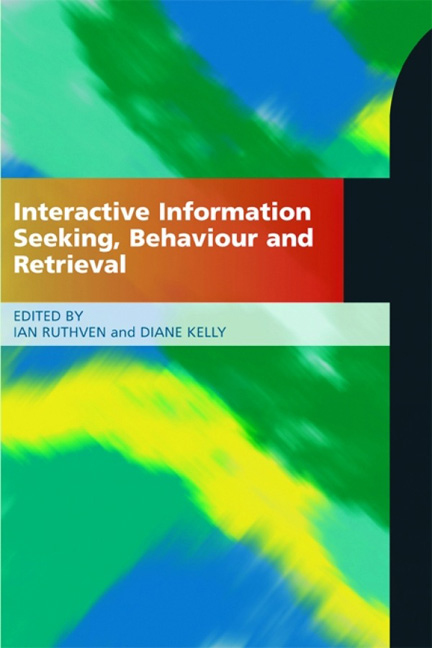Book contents
- Frontmatter
- Dedication
- Contents
- Figures and tables: acknowledgements
- Contributors
- Foreword
- Preface
- 1 Interactive information retrieval: history and background
- 2 Information behavior and seeking
- 3 Task-based information searching and retrieval
- 4 Approaches to investigating information interaction and behaviour
- 5 Information representation
- 6 Access models
- 7 Evaluation
- 8 Interfaces for information retrieval
- 9 Interactive techniques
- 10 Web retrieval, ranking and personalization
- 11 Recommendation, collaboration and social search
- 12 Multimedia: behaviour, interfaces and interaction
- 13 Multimedia: information representation and access
- References
- Index
3 - Task-based information searching and retrieval
Published online by Cambridge University Press: 08 June 2018
- Frontmatter
- Dedication
- Contents
- Figures and tables: acknowledgements
- Contributors
- Foreword
- Preface
- 1 Interactive information retrieval: history and background
- 2 Information behavior and seeking
- 3 Task-based information searching and retrieval
- 4 Approaches to investigating information interaction and behaviour
- 5 Information representation
- 6 Access models
- 7 Evaluation
- 8 Interfaces for information retrieval
- 9 Interactive techniques
- 10 Web retrieval, ranking and personalization
- 11 Recommendation, collaboration and social search
- 12 Multimedia: behaviour, interfaces and interaction
- 13 Multimedia: information representation and access
- References
- Index
Summary
Introduction
Information retrieval systems are purposeful devices developed to service multiple objectives from locating the current weather conditions to identifying critical evidence for use in complex decision making. Those systems evolved from extracting bibliographic data held in large libraries of references, to retrieving nuggets of information from full-text repositories. However, we tend to think of information retrieval systems simply as generic search systems that respond to a query with a set of results to meet some information need, rather than purposeful applications whose raison d’être is to deliver task-specific information that leads to problem resolution. The early discussions about information retrieval systems implicitly and erroneously equated the concept of task with a user's information need, problem, question or request (e.g. Saracevic et al., 1988; Saracevic and Kantor, 1988a, 1988b; Tague-Sutcliffe, 1992); the exact word used depended on the decade and origin of the work. The task that triggered the need was usually considered peripheral to the research.
The explicit study of task is relatively new in information science. It appeared, for example, as an index term only in the second edition of Case's (2002, 2007) seminal analyses of information needs and seeking research. Its systematic use in information seeking and retrieval research is within the 21st century, a focus that occurred for several reasons, and possibly as a consequence of all of them:
• Studies of ‘online searching’ went from being assessments of search outcomes and processes (see, for example, Saracevic et al., 1988; Saracevic and Kantor, 1988a, 1988b), to testing experimental variables (e.g. Koenemann and Belkin, 1996). Research protocols also went from being quasi-experimental and observational, to being more formally designed as human-based experiments following standard research design practices.
• With the emergence of human–computer interaction in the 1980s came user-centred design and user testing, which brought user intentions, requirements and tasks to the forefront of systems development, and with it the premise that systems support people and the work that they do – their tasks. Using scenarios and tasks to design systems and for system and usability testing became de rigueur (see, for example, Rosson and Carroll, 2002). These developments have influenced information seeking and retrieval research, although a set of requirements has rarely been specified for a particular information retrieval application, for example a law office or an educational setting.
- Type
- Chapter
- Information
- Interactive Information Seeking, Behaviour and Retrieval , pp. 43 - 60Publisher: FacetPrint publication year: 2011
- 6
- Cited by



